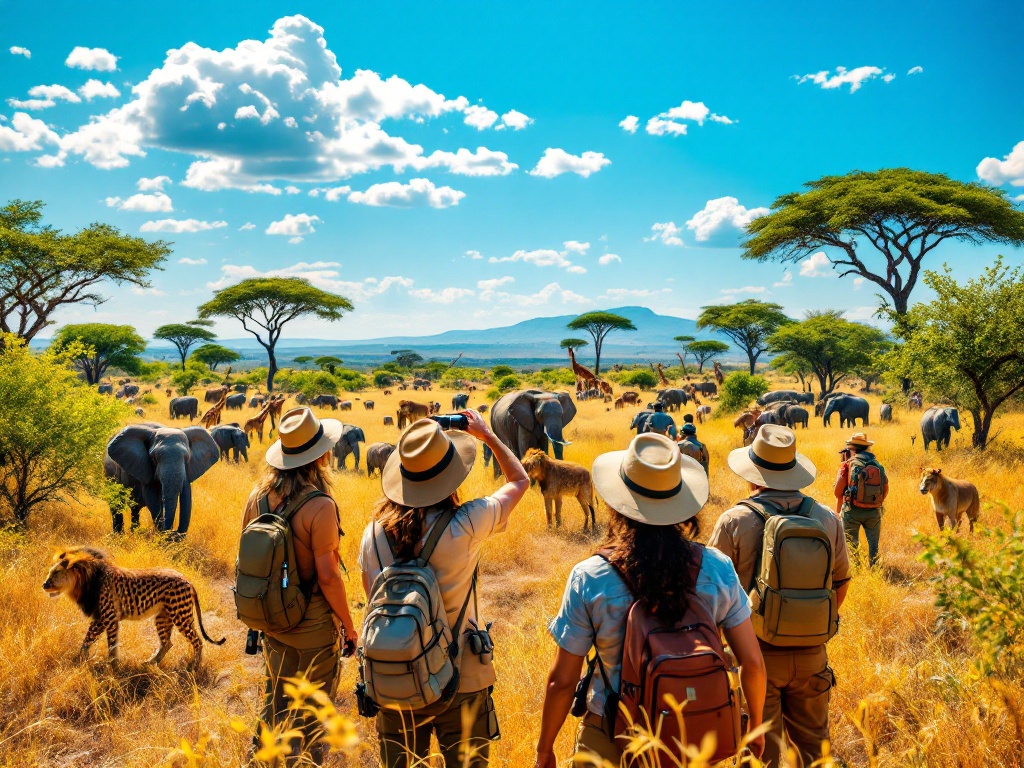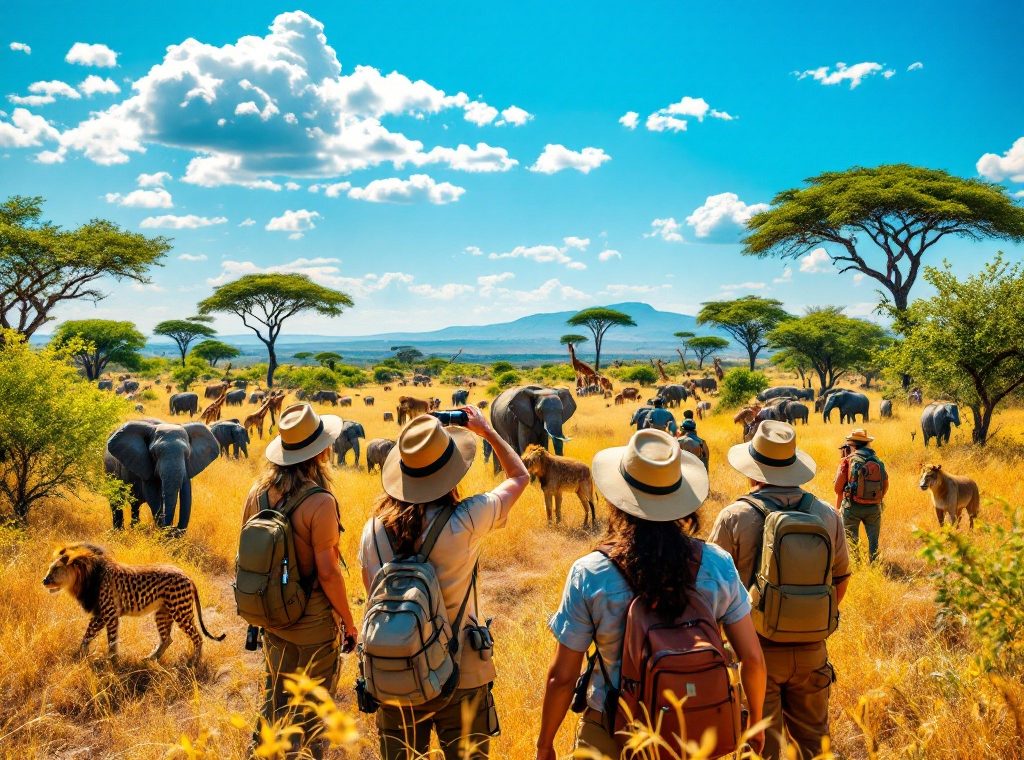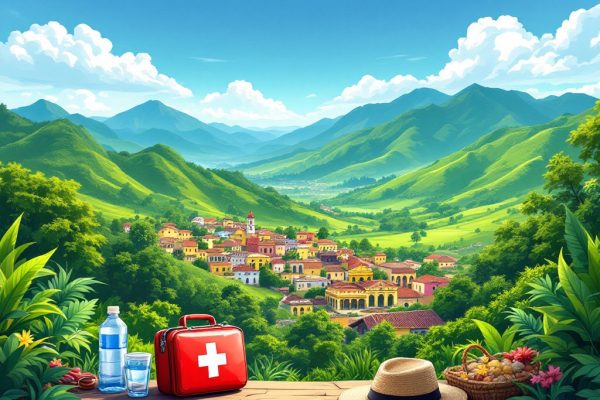Health Recommendations When Traveling to Africa
Dreaming of an African safari? Don’t let preventable illnesses ruin your trip! Yellow fever, hepatitis, and typhoid are real risks, but easily mitigated with proper vaccinations. Learn which immunizations are essential, plus vital tips on malaria prevention, food and water safety, and avoiding insect-borne diseases. Prepare for a healthy adventure – read on to discover how.
Important information

- Consult a doctor or travel health specialist 4-6 weeks before your trip to Africa to discuss vaccinations and necessary precautions.
- Vaccinations for yellow fever, hepatitis A and B, typhoid, and meningococcal meningitis are often recommended, with additional vaccines like rabies and cholera depending on your itinerary.
- Protect yourself against malaria by using antimalarial medication, insect repellent with DEET, and insecticide-treated mosquito nets. Avoid contact with fresh water to prevent schistosomiasis.
- Practice safe food and water habits by consuming bottled or boiled water, eating thoroughly cooked meals, and peeling fruits and vegetables. Pack a traveler’s diarrhea kit.
- Obtain comprehensive travel insurance that covers medical expenses, evacuations, and trip cancellations. Research local medical facilities and stay updated on travel health notices from reliable sources like the CDC and WHO.
Essential Vaccination Requirements for Africa
Planning an African trip? Protecting yourself with vaccinations is crucial. Diseases like yellow fever, hepatitis A and B, typhoid, and meningococcal meningitis pose serious risks. Depending on your specific itinerary, additional vaccinations for rabies or cholera might be recommended. Consult your doctor or a travel health specialist ideally 4-6 weeks before departure. They can provide personalized advice on necessary vaccinations and ensure your routine immunizations are up-to-date, a vital step for any international journey.
Consult your doctor or a travel health specialist 4-6 weeks before your trip. They can assess your health status and recommend necessary vaccinations.
Get vaccinated against diseases like yellow fever, hepatitis A and B, typhoid, and meningococcal meningitis. These pose significant health risks in Africa.
Discuss possible additional vaccinations for rabies or cholera with your doctor, depending on your travel plans within Africa.
Ensure your routine immunizations are up-to-date. This is a crucial step for any international travel.
Routine Vaccinations and Their Importance
Traveling to regions like Africa requires essential travel vaccinations to prevent diseases. Key vaccinations for such trips include: Hepatitis A and B, Meningitis, a Polio booster, and Typhoid. These immunizations protect you and help prevent spreading these diseases.
Key Vaccines: Hepatitis A, Hepatitis B, and More
Planning a trip to Africa? Hepatitis A and B vaccinations are essential. Also, consider the meningitis vaccine, particularly if your travels include sub-Saharan Africa’s Meningitis Belt. For personalized recommendations based on your itinerary, consult your doctor.
Yellow Fever Certification and Entry Requirements
Some African countries require proof of yellow fever vaccination with an International Certificate of Vaccination or Prophylaxis (ICVP). This certificate is also required if you have recently traveled through a high-risk yellow fever country. These certificates are available only at designated yellow fever vaccination centers.
Rabies and Polio Vaccines: When They Are Necessary
Before traveling, take necessary health precautions. Consult a healthcare professional for personalized advice. If you plan to interact with animals, consider a rabies vaccine. Adults staying in certain African countries for four weeks or more should get a polio booster.
Preventing Malaria and Other Infectious Diseases
Protect yourself from malaria by using medicine, insecticide-treated bed nets, and insect repellent. Consult your doctor about prescription antimalarial drugs. Apply DEET insect repellent and cover exposed skin for extra protection.
Malaria Prevention: Antimalarial Tablets and Mosquito Nets
Planning an African trip? Consult your doctor about antimalarial medication for protection against malaria. Insecticide-treated mosquito nets offer extra protection, especially at night, shielding you from bites while you sleep. For the most effective protection, use insect repellent in addition to a mosquito net.
Cholera and Schistosomiasis: Avoiding Contaminated Water
Cholera, a bacterial infection, and schistosomiasis, a parasitic illness, are both contracted through contaminated water. Travelers can minimize these risks by taking simple precautions. Avoid untreated tap water, ice, and raw or undercooked foods washed in potentially contaminated water. Opt for bottled or purified water for drinking, brushing teeth, and washing fruits and vegetables. Refrain from swimming or bathing in freshwater lakes and rivers to further reduce your risk.
- Avoid untreated tap water, ice, and raw or undercooked foods washed in potentially contaminated water.
- Opt for bottled or purified water for drinking, brushing teeth, and washing fruits and vegetables.
- Refrain from swimming or bathing in freshwater lakes and rivers.
Understanding the Meningitis Belt and Vaccination Needs
The Meningitis Belt, stretching across sub-Saharan Africa from Senegal to Ethiopia, is susceptible to meningococcal meningitis outbreaks. This severe bacterial infection can be life-threatening or cause permanent disability, affecting the brain and spinal cord. The Meningitis A vaccine is crucial for travelers to this region. Consult a healthcare professional for personalized advice on additional protection against other meningococcal meningitis types (C, W, and Y), based on individual risk factors and travel plans.
Safe Eating, Drinking, and Insect Avoidance
Drink bottled water instead of tap water.
Eat thoroughly cooked food.
Avoid raw or undercooked meat, seafood, and eggs.
Peel all fruits and vegetables before eating.
Use insect repellent containing DEET to protect yourself from mosquito and other insect bites.
Pack a traveler’s diarrhea kit to manage potential digestive upset.
Food and Water Safety Tips for Travelers
For a healthy African adventure, prioritize safe food and water. Stick to bottled or boiled water, and skip tap water and ice cubes. Avoid unpeeled fruits and vegetables, opting instead for thoroughly cooked, hot meals. Street food can be tempting, but exercise caution. Frequent handwashing with soap is a simple yet effective way to minimize health risks.
Safe Hydration: Drink only bottled or boiled water. Avoid tap water and ice cubes.
Food Safety: Choose thoroughly cooked, hot meals. Avoid unpeeled fruits and vegetables.
Street Food Caution: Exercise caution when consuming street food.
Hand Hygiene: Wash your hands frequently with soap.
Insect Repellent Use and Avoiding Bug Bites
Shield yourself from mosquito bites with an insect repellent containing DEET or picaridin. For added protection, cover exposed skin by wearing long sleeves, pants, and socks. When sleeping, use insecticide-treated bed nets. Indoors, air conditioning or screens offer safe havens. If venturing out is unavoidable, especially at dawn and dusk when mosquitoes are most active, take extra precautions.
- Use insect repellent with DEET or picaridin.
- Wear long sleeves, pants, and socks.
- Sleep under insecticide-treated bed nets.
- Stay indoors with air conditioning or screens.
- Take extra precautions outdoors, especially at dawn and dusk.
Traveler’s Diarrhea Kits: Being Prepared
Traveler’s diarrhea kits offer essential relief from uncomfortable symptoms, such as diarrhea, nausea, and vomiting. These kits usually include antidiarrheal medication, oral rehydration salts, and antiemetics to combat nausea. For added safety, carry a list of local medical resources.
Special Health Considerations When Traveling in Africa
Consult your doctor. Before embarking on your African adventure, schedule a visit with your doctor to discuss necessary vaccinations and other essential health precautions.
Be cautious around animals. Avoid contact with animals to minimize your risk of rabies.
Prepare for higher altitudes. If your travels include higher altitudes, be mindful of Acute Mountain Sickness (AMS). Symptoms include headaches, nausea, and dizziness. If you experience these, descend to a lower altitude immediately. Altitude medication can also offer relief.
Avoid fresh water contact. Steer clear of contact with fresh water to prevent infections such as schistosomiasis.
Pack a traveler’s diarrhea kit. Include this essential kit in your luggage and practice safe food and water habits.
Use insect repellent. Apply insect repellent diligently to protect yourself against mosquito and other insect bites that can transmit diseases like malaria.
Acute Mountain Sickness and Altitude Medication
Traveling to high altitudes in Africa can trigger acute mountain sickness (AMS), which causes unpleasant symptoms such as headaches, nausea, dizziness, and shortness of breath. To prevent AMS, follow these guidelines: ascend gradually, hydrate often, and allow sufficient time for acclimatization. If symptoms occur, descend immediately. Consult your doctor about altitude medication before your trip to minimize your risk.
Risks of Fresh Water Contact and Avoidance
Fresh water can be a source of schistosomiasis, a parasitic disease contracted through contaminated sources. To minimize this risk, avoid swimming in lakes and rivers, and refrain from bathing or wading in ponds. Showering with treated water, however, is generally safe and significantly reduces the chance of infection.
Avoiding Animal Contact and Rabies Prevention
Protect yourself from rabies by avoiding contact with animals such as dogs, cats, bats, and monkeys. If you are bitten or scratched, immediately wash the wound thoroughly with soap and water, and then seek prompt medical attention. Veterinarians, wildlife researchers, and other high-risk individuals should consider pre-exposure rabies vaccinations. If you’ve been exposed to a potentially rabid animal, post-exposure prophylaxis (PEP) is essential for your health. Here’s what you should do:
Avoid contact with wild animals. Exercise caution around unfamiliar animals, especially in areas where rabies is prevalent.
Wash any bite or scratch immediately. Thoroughly cleanse the wound with soap and water for at least 15 minutes. This helps remove the virus.
Seek immediate medical attention. A doctor will assess your risk and determine if post-exposure prophylaxis (PEP) is necessary.
Consider pre-exposure vaccination. If you work with animals or travel to high-risk areas, preventative vaccination is recommended.
Health Care During Travel: Planning for Safety
Safeguarding your trip with travel insurance is crucial. A comprehensive policy protects you from unforeseen medical expenses, emergency evacuations, and trip cancellations. Ensure your coverage includes medical care abroad and repatriation. If you’re planning adventurous activities like safaris, confirm they are included in your policy. Before you go, research reputable local medical facilities and understand how to access them in an emergency. Staying informed about travel health notices is also key. These provide important updates on disease outbreaks and safety concerns. Consulting official sources before and during your trip will contribute to a healthy and secure journey.
Get Travel Insurance: A comprehensive travel insurance policy is crucial for protecting yourself from unforeseen medical expenses, emergency evacuations, and trip cancellations.
Ensure Proper Coverage: Make sure your insurance policy includes medical care abroad and repatriation.
Coverage for Adventure Activities: If you plan on adventurous activities like safaris, confirm they are included in your policy.
Research Local Medical Facilities: Before you go, research reputable local medical facilities and understand how to access them in an emergency.
Stay Informed About Travel Health Notices: Stay informed about travel health notices for important updates on disease outbreaks and safety concerns.
Travel Insurance and Medical Evacuation Planning
Traveling abroad? Travel insurance is essential. It protects you from unexpected medical costs, like injuries, illnesses, or other health emergencies. A good policy should cover medical evacuation, but it’s vital to ensure your coverage meets your health needs, especially regarding emergency services in Africa. Keep important information handy, such as insurance details and emergency contacts. Planning for medical evacuation is crucial for quick access to proper medical care when needed.
Accessing Medical Care While Traveling in Africa
Before your African adventure, locate local clinics and hospitals and save their contact details. If you feel unwell during or after your trip, consult a doctor immediately. Always carry your health insurance information and inform your doctor about your recent travels for accurate diagnosis and treatment.
Travel Health Notices and Keeping Informed
Stay informed about potential health risks for a safe and healthy trip. Consult reliable sources before and during your travels, such as government health websites like the CDC and WHO. These resources provide travel advisories, health notices, details on disease outbreaks, and recommended vaccinations and precautions. You can also sign up for travel health notification services from government agencies or specialized providers to receive timely alerts about your destination. Check with your country’s embassy or consulate for valuable local health insights.


















